January 2015 – NAPS/USPS Consultative Meeting Minutes
- in L.T.S. Materials
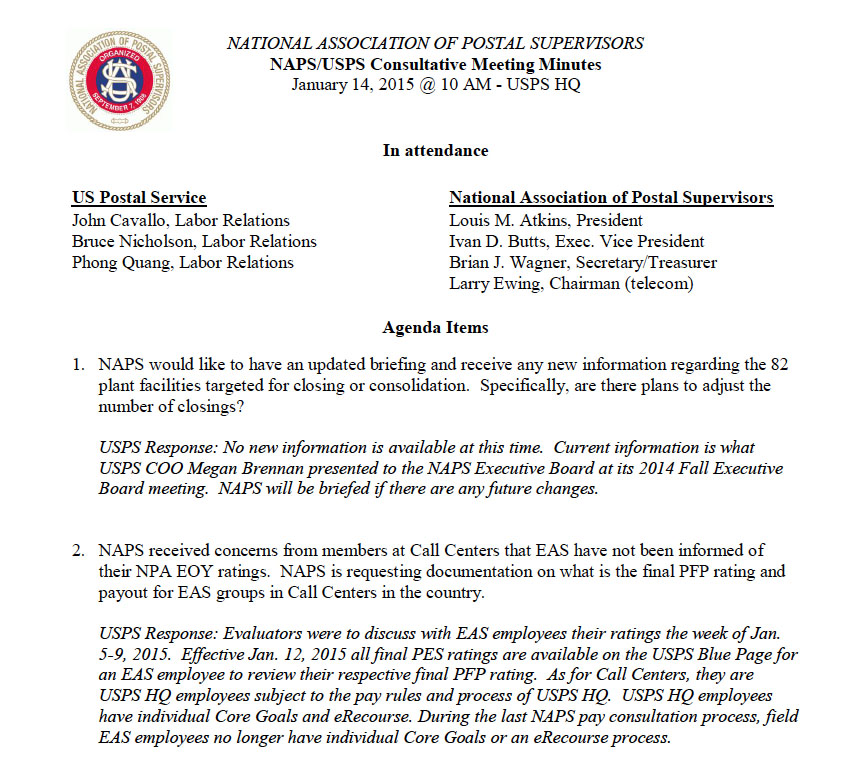
A VIEW FROM THE BRIDGE

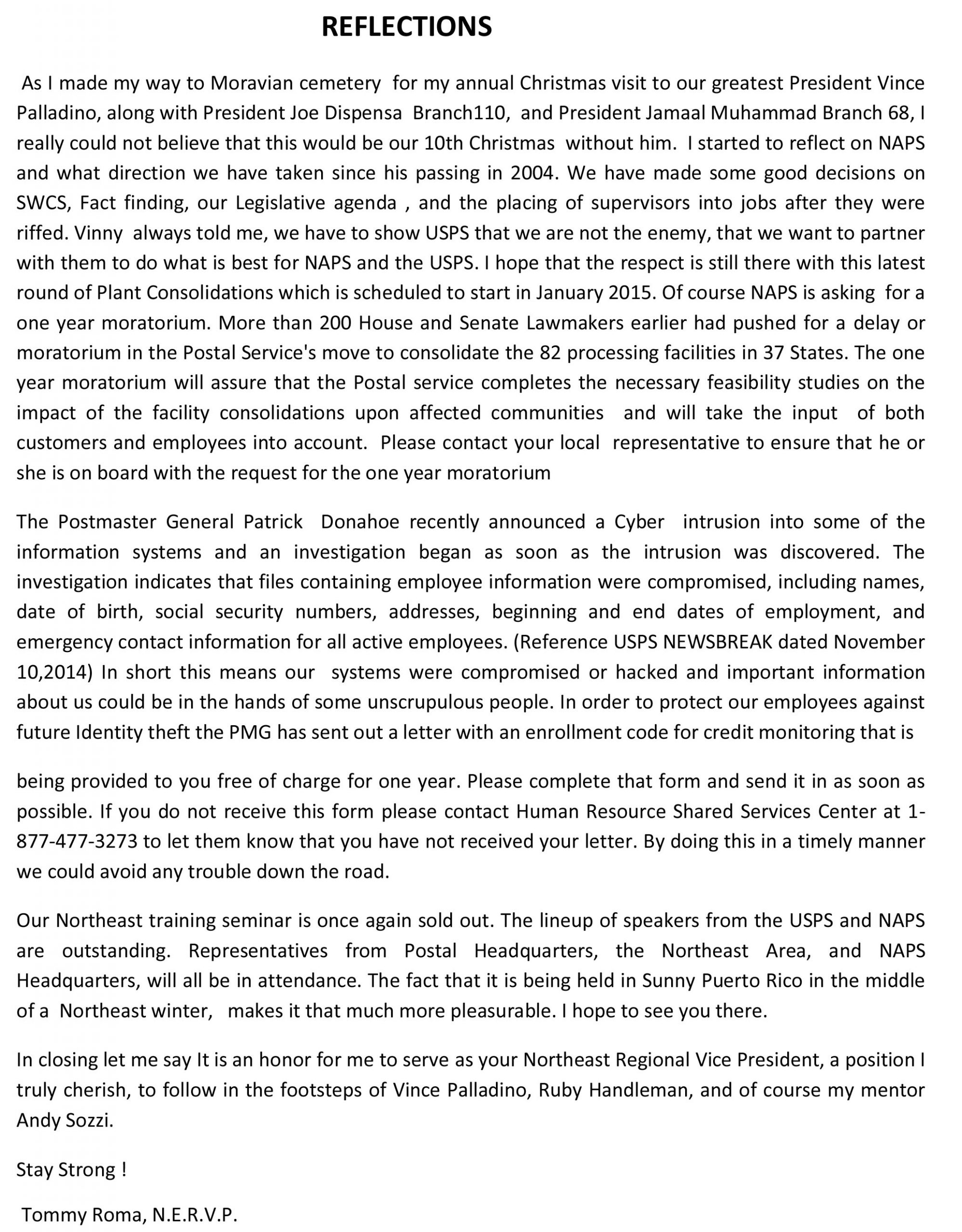

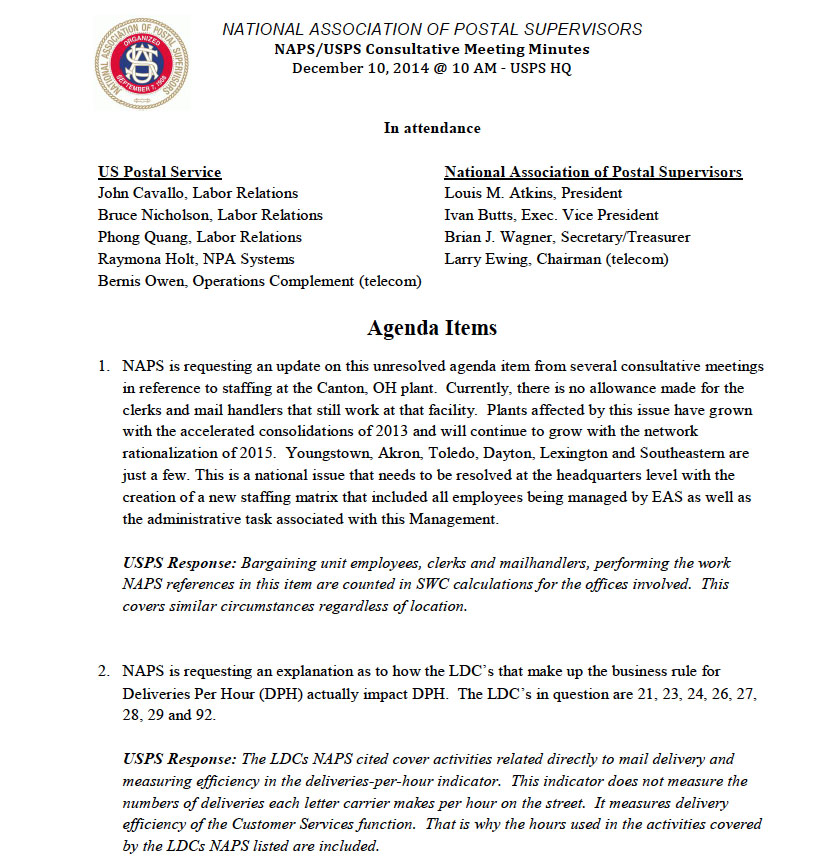
President Jamaal Muhammad Branch 68 and President Joe Dispensa Branch 110.
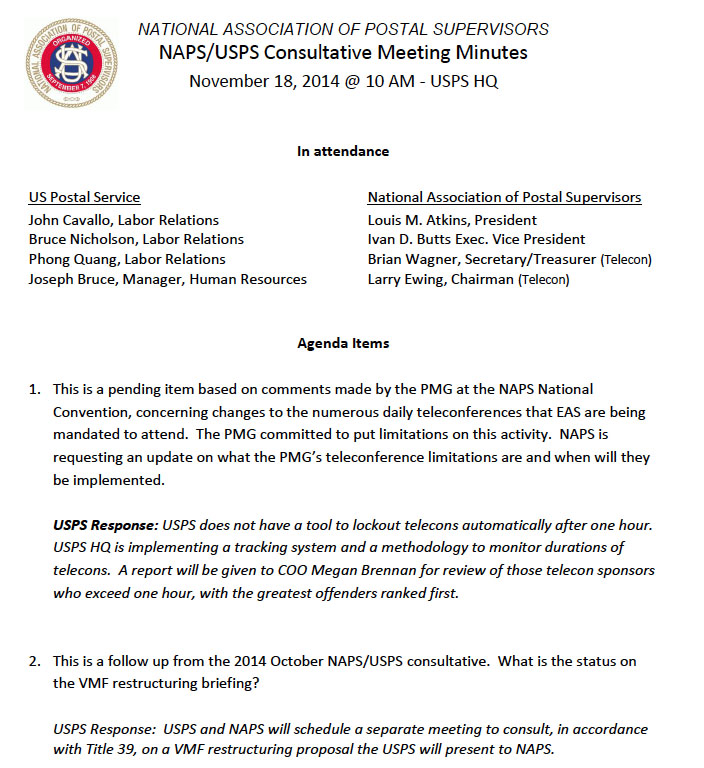
When I returned from our national convention in San Diego at the end of August, I left with the feeling that we would start fresh with a new resolve to work together. We had changes on the executive board, both at the resident officer level and on the rest of the board. While things didn’t go exactly as I would have liked it, nevertheless like many of us, I felt that we would move on and move forward.
I was looking forward in some respects to the fall board meeting to see how things would go. Well, they say that imitation is the most sincere form of flattery. One of our president’s first acts was to establish committees to oversee aspects of NAPS operations – the very same committees that his opponent in the election had campaigned on. When the idea was first proposed by Jay Killackey at the end of 2013, I thought it was a great idea. It turns out; our president thought it was a good idea too!
But, the plan first laid out over a year ago wasn’t totally copied as I was to learn during the board meeting. When the committee chairmanships were announced, as a regional vice president I was placed on the SWC committee as a member while our own New York Area vice president, Jimmy Warden was assigned to be the chairman of the SWC committee.
I wasn’t the only person on the executive board that was surprised by this announcement. After the announcement was made, numerous members of the executive board approached me on the side and asked me what I had done to the president that he would disrespect me so severely? After all, I have been on all of the prior SWC committees and am probably the most knowledgeable delivery person on the current executive board. I am the most senior person that is left from the prior SWC Committees.
Not being someone to stay quiet when I get insulted, I challenged this decision by our president. The response was a phony affront that the president wanted to have Jimmy Warden head this important committee because he was still an active postal employee while I am retired. Keep in mind that three of the five regional vice presidents are also retired and the two other retired regional vice presidents are the heads of other committees.
I believe that this appointment was made to place a wall between Jimmy Warden and I and the close knit team we have been since I took over for Andy Sozzi and Jimmy Warden became the New York area vice president. The day after this insulting action took place, and he got so much negative feedback from me and other board members, our president asked me for a private meeting where he then offered me the chairmanship. His decision was like having an MDO report to a supervisor. Yes, we do have a chain of command in NAPS, just like the Postal Service.
After the way I was disrespected the prior day, I declined this feeble offer and advised the president if he thought so little of my position or past contributions in his original selection, it was too far gone for him now to try to appease how he disrespected me in front of the entire executive board.
I have to say that I was also concerned about other discussions held that didn’t seem to make the minutes of the meeting, where the resident officers floated the idea of selling NAPS Headquarters and then rent out our current space from the individuals who would purchase our beloved building. Why Vince Palladino had to have been rolling over in his grave like a rotisserie as he looked down on our meeting from above. Do you know anyone who sells their property and then leases it from the new owners?
For those of you who come to my website for information, I have to say – things aren’t going well in our organization when things like this are happening. Our president won his election by a mandate of a margin of two to one. This was a huge win but now our president seems more intent on excommunicating those who did not support him rather than using his mandate to lead this organization to greater heights.
At the same time certain other members of the board are being singled out in the same manner as I am, NAPS isn’t getting anywhere. There is less information being disseminated to the board and the membership. We haven’t received any word from NAPS headquarters about how our 2014 NPA will turn out. The Mailhandlers just got over a $2,000 annual increase in their pay and nearly half of our members are going to go without a pay increase for another year.
Like many of you, I give everything I have to my job as your regional vice president. Something I will continue to do . It is a good thing that NAPS doesn’t have a VOE survey. Many of you are dissatisfied with the current state of NAPS. I will continue to do everything I can to remain diligent and put these childish acts aside as we get ready to fight more job cuts and consolidations. One thing that they haven’t realized is; this New Yorker is as resilient as all New Yorkers. We get ourselves up, dust ourselves off and get back into the game. It’s too bad that it has come to this – but in my opinion that is where we are today.
Stay Strong
Tommy
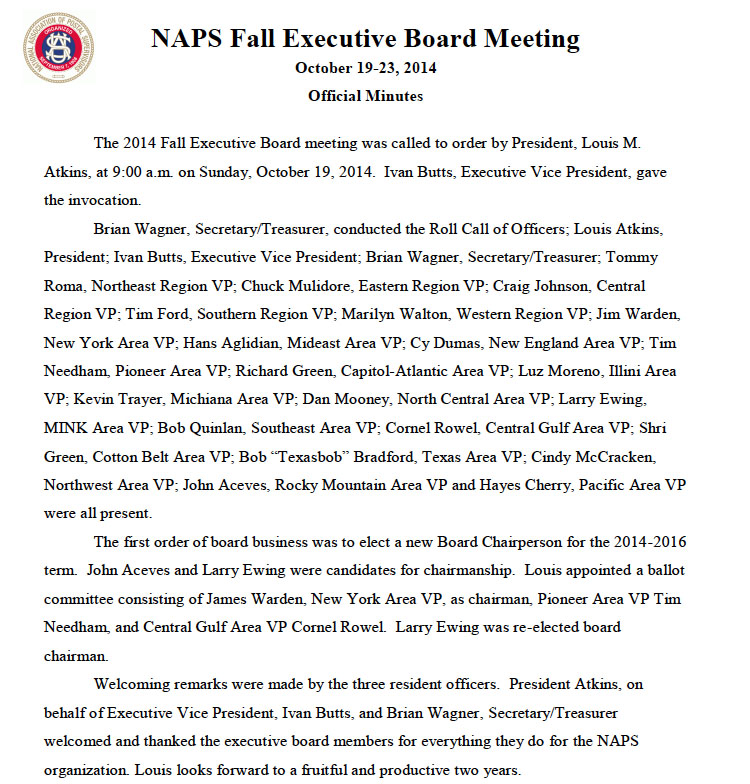
NAPS HQ was informed by USPS HQ officials that a cyber-breach of USPS employee data occurred. Please share the attached USPS Newsbreak, FAQ’s, and Employee Handout with your NAPS membership. NAPS will provide any additional information received to the Executive Board and will post this information on our NAPS Website under Breaking News.
Thank you.
Tommy Roma
NEWSBREAK
Notification of cyber intrusion and employee data compromise
The Postal Service recently learned of a cyber intrusion into some of its information systems and an investigation began as soon as the intrusion was discovered. Steps already have been taken to strengthen the security of USPS systems and there will be additional measures in the coming days and weeks.
The investigation indicates that files containing employee information were compromised, including names, dates of birth, social security numbers, addresses, beginning and end dates of employment, and emergency contact information for all active employees. In addition, we are aware of a possible compromise of injury claim data that we are still investigating involving a small number of employees. Individualized letters will provide everyone with specific information about their particular situation.
PMG Patrick Donahoe has recorded a special video for employees with background information, an explanation of steps being taken to protect employees, and an explanation of resources available on the cyber incident.
“I’d like to say how bad I feel that the whole organization has been victimized,” says Donahoe. “The Postal Service has put in a lot of effort over the years to protect our computer systems and the bad guys haven’t been successful until now.”
Donahoe apologized that the incident happened. “You also have my commitment that we will help all of our employees deal with the situation,” he said. “We are a resilient organization and we’ll get through this.”
Click here for full Newsbreak Article.
EMPLOYEE FAQs
USPS Cyber Intrusion and Employee Data Compromise
November 10, 2014
Employee Frequently Asked Questions
1. How and when did the security breach occur?
The Postal Serve recently learned of a cyber intrusion into some of its information systems. This type of intrusion is not unique; you likely have read multiple news stories on similar intrusions into U.S. companies and other Federal government agencies. We are not aware of any evidence that any of the compromised employee information has been used to engage in any malicious activity. We are working closely with the Federal Bureau of Investigation, Department of Justice, the USPS Office of Inspector General, the Postal Inspection Service and the U.S. Computer Emergency Readiness Team. The Postal Service has also brought in private sector specialists in forensic investigation and data systems to assist with the investigation and remediation to insure that we are approaching this event in a comprehensive way, understanding the full implications of the intrusion and putting in place safeguards designed to strengthen our systems.
2. Why were employees not told of the breach immediately after it was discovered?
Communicating the breach would have put the remediation actions in jeopardy. We are unaware of any evidence that any of the compromised employee information has been used to engage in any malicious activity or to enable identity theft crimes.
Click here for full Employee FAQs.
EMPLOYEE HANDOUT
USPS Cyber Intrusion and Employee Data Compromise
Employee Handout
This document provides you with information about the recent cyber incident. It is meant to accompany a stand-up talk from your manager/supervisor, after you’ve seen a special PMG video message, and/or stand-up talk on November 10, 2014. All impacted employees will receive a letter at their address of record within ten days.
Situation
The Postal Service recently learned of a cyber intrusion into some of our information systems. This basically means that someone who didn’t have permission was able to get into some of our computer networks. This type of intrusion is not unique; you likely have read multiple news stories on similar intrusions into U.S. companies and other Federal government agencies.
We began investigating the intrusion into our systems as soon as we discovered it. We are working closely with the FBI, the Department of Justice, our own Inspector General and Postal Inspection Service, and the U.S. Computer Emergency Readiness Team. Additionally, we’ve brought on outside experts who specialize in investigations and data systems to help us understand what happened and how to improve our security.


Tommy with Postmaster General, Megan Brennan at NAPS Executive Board Dinner
